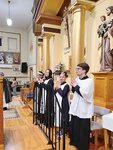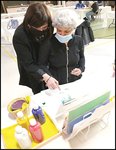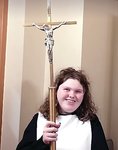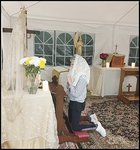



“Unless you become like children, you will never enter the kingdom of heaven.” Matthew 18:3
People of all ages arrive at the biweekly gatherings. They might walk differently, speak differently or not at all; some might exhibit obvious disabilities, others might not. All are greeted by smiling faces. Soft music plays as each one chooses a quiet activity to work on. After a while, a lamp goes off, signaling that it is almost time to move into another room for catechesis.
Beautiful decorations and visual aids in the “Celebration Room” demonstrate that their religious education is vitally important to the life of the Church. No matter their age, they display a childlike innocence and the pure faith that Jesus said was necessary to enter the kingdom of heaven.
For over 40 years in the Diocese of Providence, the SPRED (Special Religious Education) program has given people with physical and cognitive disabilities a place of their own to learn about God and his plan of salvation for their lives.
Irma Rodriguez oversees SPRED as one of her many duties as director of the Office of the Apostolate with People with Disabilities. Her involvement relates directly to her own family’s needs. Years ago, she wanted to see her son, now a grown man, receive his sacraments in the Catholic Church, but with his autism, she knew his preparation would be challenging for him. As a religious education teacher in 2000, she attended a diocesan conference which included a session on special religious education, “so I went and that was it; that was the beginning.”
The program
Rodriguez learned about the SPRED program, which had been operating in the diocese since the early 1980s. Though her parish didn’t offer it, her priest informed her that they could if she would lead it. “And I was grateful for that. And that’s how it started at my parish,” Rodriguez stated.
As SPRED originated in the Archdiocese of Chicago in 1966 when parents there asked for faith formation for their children with special needs, she went there for training. Based on what is known as the Vivre method, SPRED was developed by two priests, Father Jean Mesny from Lyon, France, and Father Euchariste Paulhus from Quebec. Since 1966, it has expanded into other dioceses around the world, including the Diocese of Providence.
Msgr. Gerard O. Sabourin, director of the Office of the Apostolate with People with Disabilities from its inception until just a few years ago, researched the method, meeting Father Paulhus several times and spending time in training in Chicago. SPRED uses Montessori elements, symbolic catechesis integrating Father Mesny’s “Vivre” method.
The Center for Disease Control and Prevention’s Disability and Health Data System (DHDS) 2022 states that 1 in 4 (26 %) of adults in the United States have some type of disability. In Hispanics it is higher at 1 in 6, and Whites at 1 in 5, according to Rodriguez, who noted that many professionals argue that figure is much higher. Recent estimates in the United States show that about 1 in six, or about 17%, of children ages 3 through 17 have one or more developmental disabilities, with many professionals arguing the true number is also much higher.
The need for special religious education continues to grow as more and more children receive developmental diagnosis.
These diagnoses follow them into adulthood, so some participants who began as children and are now adults remain involved in SPRED, with younger ones joining each year. Rodriguez explained that: “We have 10-year-olds, but we also have 60-year-olds, and we separate them by age groups the best we can.” Currently, there are four different age groups in the program.
SPRED Total Communities (catechists and people with disabilities), are held every other week for a total of 12 weeks at various parishes throughout the diocese, and the program maintains the same structure at each, crucial for people with disabilities like autism. Catechists, often retirees, personally engage with each participant – called “friends” – modeling behavior and the Catholic faith for them. “We represent Jesus and Jesus’ love and the Blessed Mother’s love for them. We work really hard on trying to develop these one-on-one relationships.”
The evening ends with participants and catechists sharing a meal.
“I just love it. I love the method, I love that it does have a contemplative aspect to it; there’s time for quiet, there’s time for sharing the Word of God, time for getting a little bit more immersed in God’s presence and love, and then time to share — we call it “agape,” to break bread and eat together,” Rodriguez commented.
The year even ends with a gathering as SPRED members and their families are invited to a diocese-wide picnic. It is certainly a day for celebration, though Mass remains the central focus of the day.
Family life enhanced
For roughly 20 years, Frank and Linda Lawrence have personally seen the happiness SPRED has brought their son, Willie, now 30. Willie has autism and is nonverbal, and Frank describes his son as easygoing and happy.
Willie attends SPRED nights regularly because, as Linda noted, “Willie likes church. Even when he was little, he liked going to church.” So when they learned about the program, Frank and Linda thought it was something he would enjoy, and he did.
The program benefits both Willie and his parents. It gives him an opportunity to worship God with people of similar abilities — and a break from his electronic entertainments — and gives his parents much-needed time for themselves.
Frank recently witnessed the program in action for the first time, as the couple stayed to help on an evening when catechists were in short supply. He praised the program and lauded the catechists who prepared participants to learn about God.
In general, however, parents give their children all the time and space that they need to attend SPRED meetings. “That’s his time… I know he’s happy where he is, I know he’s happy with the program,” Linda concluded.
Catechists find fulfilment
SPRED programs like Willie’s were put on hold during the pandemic and often saw changes afterwards among participants and catechists alike, and the need for catechists has grown. But those who dedicate themselves to SPRED do so out of love for the Church and for others. Many have been a part of the program for more than 20 years, and others had to withdraw due to the pandemic.
One long-term catechist, Catherine Turbitt, became involved at the very beginning of the program within the diocese. Though age limits her involvement nowadays, she speaks lovingly of her time as a leader catechist and the people she serves. She continues weekly as a helper catechist.
Her involvement began when, as she said, “I was looking for something to do that was more than a women’s club. I knew of special-needs people in the parish,” so when another parishioner asked her to join a program that would become SPRED, she accepted.
Over the decades, Turbitt has seen incredible fruit from her labors, noting the impact SPRED has had on the lives of people with disabilities, their families and the Church as a whole.
“The work has given me great joy. It’s been a big part of my own spirituality; it’s helped my spirituality, my family’s spirituality,” she said.
More than that, though, she says, “I found love.”
Bob and Diane Cardillo volunteer for similar reasons. They began with SPRED in the fall of 2000. Diane said, “I had a little seed in my head, thinking, ‘You need to do something for the Church.’” She had heard about SPRED, so when a representative came to her parish to speak about it, she attended and signed up on the spot, becoming a leader catechist by default.
That night, she took one of the pamphlets from the evening and placed it on Bob’s pillow with a note saying they should volunteer together. He accepted the invitation and became the activities catechist for the ministry, a role in which he welcomes friends to the gathering and prepares the art and various activities which will be used for the session. He also engages them in conversations to ensure greater inclusion within the Church for those with disabilities. “That brings it together as a community,” he remarked.
The Cardillos echoed Turbitt’s sentiments, stating that the hours they spend with their special-needs friends bring them great joy. “They probably give us more than we give them,” Diane said.
Part of that comes from watching their special friends’ development. Diane shared many stories of the heartwarming moments she had witnessed through the years. One involved a young man who has been a part of the program since childhood, now in his twenties and working part time. He recently told her how he felt it was time for him to give back, namely by purchasing toys for the needy through Toys for Tots.
Bob affirmed that the participants “always look forward to coming; it’s a nice program for them.”
Becoming a catechist
Years of study or specialized degrees are not required to become a catechist, Rodriguez noted. The lead catechist does most of the preparation work for catechesis, while helper catechists’ most important responsibility is to be present to model the faith for the participants. The only requirement for catechists, Rodriguez said, is “to love, and if you really love our faith, you will love our friends with disabilities.”
Diane agreed, saying, “You just have to be there and be joyous about your own faith. That’s it.”
Catechists also experience personal spiritual growth through the every-other-week preparation sessions. Twenty-four weeks might sound like a considerable time commitment, but for SPRED catechists, that is time well-spent. Turbitt believes the prayer and meditation time has kept her mind sharp. Catechists also find a strong faith community among the other catechists. She stated that: “When a catechist comes in, they find a home.”
To share the faith with people with disabilities is to build the Church, both Rodriguez and Diane acknowledged. “You know you’re helping them get close to God, which in a sense, helps their families,” Diane said.
Rodriguez emphasized how people with disabilities were the ones most affected by the pandemic and “all the things that have happened that they couldn’t control,” and if their spiritual needs are not met, it could cause a domino effect of parents, siblings and other family members leaving the Church due to this shortfall.
“Also, we’re part of the body. We all have a place at the table of the Lord.”